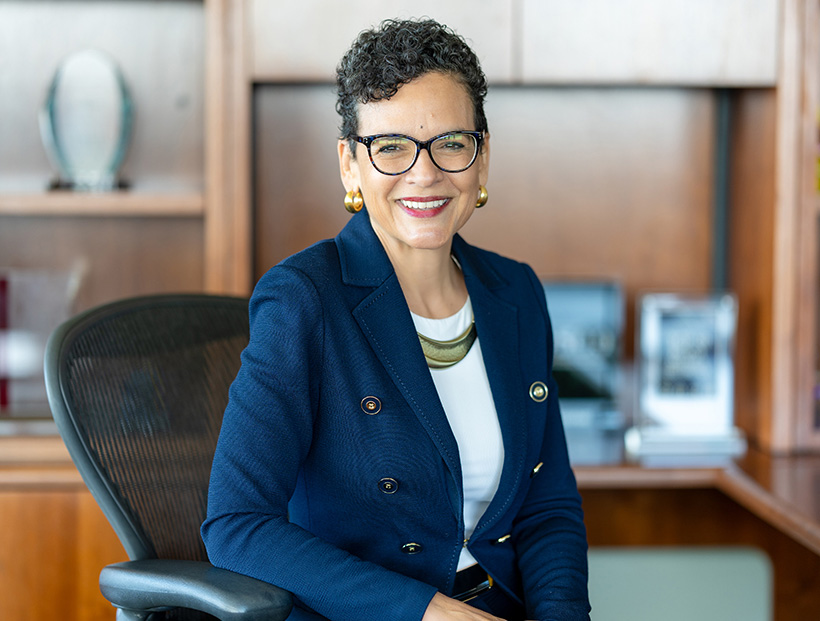Why Belonging—And Not Just Diversity—Must Be Central To Business Education
Dean Lisa Ordóñez discusses how creating a sense of belonging can help to break barriers.

When people talk about diversity in business, they often focus on race, gender, or ethnicity. These are vital, foundational aspects of who we are. But I believe we need to expand how we define diversity. It also includes differences in thought, socioeconomic background, geography, and lived experience. It’s about creating teams of people who see the world in fundamentally different ways—and giving them the skills to work together effectively. That’s where the real power lies.
As dean of the UC San Diego Rady School of Management, I’ve seen firsthand how critical this expanded definition of diversity is —not just for creating inclusive classrooms, but for building stronger businesses. Diverse organizations and those that are committed to diversity are more creative, more adaptable, and more profitable. The data (Herring, 2017; Glass & Cook, 2018; and Slater et al., 2008) are clear: organizations that embrace diversity of ideas and perspectives outperform those that don’t. This isn’t just the right thing to do; it’s the smart thing to do.
But if we want to train leaders who can unlock the full value of diverse teams, we have to start by creating environments where everyone feels they belong.
Breaking Barriers By Creating A Sense Of Belonging
When people think about increasing access to business schools, they often point to financial barriers. And yes, those are real issues we must continue to address. But in my experience, the biggest obstacle is something less visible and harder to measure: a sense of not belonging (Osterman, 2000).
Making all students feel included at institutions of higher learning is extremely important to me as a first-generation high school and college graduate. Too many people—especially those who are first-generation, low-income, from underrepresented backgrounds, or part of LGBTQ+ communities, simply don’t see themselves as business school students. They don’t see people who look like them in leadership roles. They don’t feel invited into the conversation. That sense of exclusion can be deeply internalized, and it can hold talented people back before they ever submit an application.
That’s why we launched the Belonging Initiative at Rady, because belonging is about creating an environment where every student – regardless of background – feels respected, heard, and empowered to lead. The program, which is open to all students pursuing an undergraduate business degree, is designed to build a pipeline into our graduate programs by challenging the narrative of who “belongs” in business school. We created the program to welcome students who might never have imagined themselves in an MBA classroom. By prioritizing those most at risk of feeling excluded, we foster a culture of belonging that benefits all students. Participants in the program are supported with mentoring, academic support, social activities, as well as networking and research opportunities.
Training Business Leaders Who Can Work Across Differences
At Rady, we believe in creating the ideal setting where students can learn how to work with people who think differently than they do. Diverse teams are not just more innovative—they’re also more complex. They bring tension, disagreement, and conflict. And that’s a good thing, if we teach our students how to navigate it.
Too often, conflict is seen as something to avoid. However, I believe conflict—when managed with respect and emotional intelligence—can be one of the most productive forces in any organization. It’s how we refine ideas, surface new insights, and build better solutions. At Rady, we emphasize that being “comfortable with conflict” is an essential leadership skill.
We also teach that diversity only works when people feel safe enough to bring their whole selves to the table. Psychological safety—the belief that your voice matters, that your ideas won’t be dismissed—is the foundation of inclusive leadership. And that, too, can be taught.
The Bottom Line: Belonging Drives Performance
The business case for diversity is well-established, yet diversity alone is not enough. If people don’t feel they belong, they won’t speak up. They won’t challenge assumptions. They won’t share the insights that could drive the next breakthrough. Inclusion is what unlocks the value of diversity.
I believe that business schools have a responsibility—not just to reflect the world as it is, but to shape it into what it can be. That starts with helping students understand the value of difference. It means giving them the tools to engage across lines of identity, ideology, and experience. And it requires building environments where everyone feels empowered to lead.
This isn’t just a high priority for Rady, it’s a high priority for our students, many of whom say they chose Rady because of our commitment to this issue. We are committed to creating a model of business education that doesn’t just prepare students for the workforce—but helps them transform it. Because when leaders understand how to build cultures of belonging, they don’t just change companies, they can change the world.



